- Home
- Becca Fitzpatrick
The Complete Hush, Hush Saga Page 17
The Complete Hush, Hush Saga Read online
Page 17
“What?” I said.
“Can’t hit a home run in pool.”
I nodded. “No home runs. Got it.”
His smiled stretched. “You’re holding your cue like a bat.”
I looked down at my hands. He was right. I was holding it like a bat. “It feels comfortable this way.”
He moved behind me, put his hands on my hips, and positioned me in front of the table. He slid his arms around me and took hold of the pool stick.
“Like this,” he said, repositioning my right hand up several inches. “And . . . this,” he went on, taking my left hand and forming a circle with my thumb and index finger. Then he planted my left hand on the pool table, like a tripod. He pushed the tip of the pool stick through the circle and over the knuckle of my middle finger. “Bend at the waist.”
I leaned into the pool table, with Patch’s breath warming my neck. He pulled back on the pool stick, and it glided through the circle.
“Which ball do you want to hit?” he asked, referring to the triangle of balls arranged at the far end of the table. “The yellow one in front’s a good choice.”
“Red’s my favorite color.”
“Red it is.”
Patch drew the stick back and forth through the circle, aiming at the cue ball, practicing my stroke.
I squinted at the cue ball, then at the triangle of balls farther down the table. “You’re a tiny bit off,” I said.
I felt him smile. “How much you want to bet?”
“Five dollars.”
I felt him give a soft shake of his head. “Your jacket.”
“You want my jacket?”
“I want it off.”
My arm jerked forward, and the pool stick shot through my fingers, ramming the cue ball. In turn, the cue ball shot forward, impacted with the solid red, and shattered the triangle, balls ricocheting in all directions.
“Okay,” I said, shucking off my jean jacket, “maybe I’m a little bit impressed.”
Patch examined my silk-scarf-slash-halter. His eyes were as black as a midnight ocean, his expression contemplative. “Nice,” he said. Then he moved around the table, scrutinizing the layout of balls.
“Five dollars says you can’t sink the blue striped one,” I said, selecting it purposely; it was shielded from the white cue ball by a mass of colorful balls.
“I don’t want your money,” Patch said. Our eyes locked, and the tiniest dimple surfaced in his cheek.
My internal temperature rose another degree.
“What do you want?” I asked.
Patch lowered his pool stick to the table, took one practice stroke, and drilled the cue ball. The momentum of the cue ball transferred to the solid green, then to the eight ball, and punched the striped blue into a pocket.
I gave a nervous laugh and tried to cover it up by cracking my knuckles, a bad habit I never succumbed to. “Okay, maybe I’m more than a little impressed.”
Patch was still bent over the table, and he looked up at me. The look warmed my skin.
“We never agreed on a bet,” I said, resisting the urge to shift my weight. The pool stick felt a little slick in my hands, and I discreetly wiped a hand on my thigh.
As if I wasn’t already sweating enough, Patch said, “You owe me. Someday I’ll come to collect.”
I laughed, but it wasn’t quite on pitch. “You wish.”
Footsteps barreled down the stairs across the room. A tall, stringy guy with a hawk nose and shaggy blue-black hair appeared at the bottom. He looked at Patch first, then shifted his gaze to me. A slow grin appeared, and he strode over and tipped back my 7UP, which I’d left on the rim of the pool table.
“Excuse me, I believe that’s—,” I began.
“You didn’t tell me she was so soft on the eyes,” he said to Patch, wiping his mouth with the back of his hand. He spoke with a heavy Irish accent.
“I didn’t tell her how hard you are on them either,” Patch returned, his mouth at the relaxed stage just before a grin.
The guy backed up against the pool table beside me and stuck his hand out sideways. “The name’s Rixon, love,” he told me.
I reluctantly slid my hand into his. “Nora.”
“Am I interrupting something here?” Rixon said, dividing an inquiring look between me and Patch.
“No,” I said at the same time Patch said, “Yes.”
Suddenly Rixon lunged playfully at Patch, and the two dropped to the floor, rolling and throwing punches. There was the sound of husky laughter, fists laying into flesh, and fabric tearing, and Patch’s bare back came into view. Two thick gashes ran the length of it. They started near his kidneys and ended at his shoulder blades, widening to form an upside-down V. The gashes were so grotesque I almost gasped in horror.
“Aye, get off me!” Rixon bellowed.
Patch swung off him, and as he got to his feet, his torn shirt fluttered open. He sloughed it off and tossed it into the trash can in the corner. “Give me your shirt,” he told Rixon.
Rixon directed a wicked wink at me. “What do you think, Nora? Should we give him a shirt?”
Patch made a playful lunge forward, and Rixon’s hands flew up to his shoulders.
“Easy now,” he said, backing up. He peeled off his sweatshirt and tossed it at Patch, revealing a fitted white tee underneath.
As Patch rolled the sweatshirt down over abs hard enough to put a flutter in my stomach, Rixon turned to me. “He told you how he got his nickname, didn’t he?”
“Sorry?”
“Before our good friend Patch here got mixed up in pool, the lad favored Irish bare-knuckle boxing. Wasn’t very good at it.” Rixon wagged his head. “Truth be told, he was downright pathetic. I spent most nights patching him up, and soon after, everyone started calling him Patch. Told him to give up boxing, but he wouldn’t listen.”
Patch caught my eye and passed me a gold-medal bar-fight grin. The grin alone was scary enough, but under the rough exterior, it held a note of desire. More than a note, actually. A whole symphony of desire.
Patch tipped his head at the stairs and held his hand out to me. “Let’s get out of here,” he said.
“Where are we going?” I asked, my stomach tumbling to my knees.
“You’ll see.”
As we ascended the stairs, Rixon called out to me, “Good luck with that one, love!”
CHAPTER
18
ON THE DRIVE BACK, PATCH TOOK THE TOPSHAM EXIT and parked alongside the historic Topsham paper mill sitting on the bank of the Androscoggin River. At one point, the mill had been used to turn tree pulp into paper. Now a big sign across the side of the building read SEA DOG BREWING CO. The river was wide and choppy, with mature trees shooting up on both sides.
It was still raining hard, and night had settled down around us. I had to beat my mom home. I hadn’t told her I was going out because . . . well, the honest truth was, Patch wasn’t the kind of guy mothers smiled on. He was the kind of guy they changed the house locks for.
“Can we get takeout?” I asked.
Patch opened the driver’s-side door. “Any requests?”
“A turkey sandwich. But no pickles. Oh, and no mayonnaise.”
I could tell I’d earned one of his smiles that never quite made it to the surface. I seemed to earn a lot of those. This time, I couldn’t figure out what I’d said.
“I’ll see what I can do,” he said, sliding out.
Patch left the keys in the ignition and the heater pumping. For the first couple of minutes, I replayed our evening so far in my mind. And then it dawned on me that I was alone in Patch’s Jeep. His private space.
If I were Patch, and I wanted to hide something highly secretive, I wouldn’t hide it in my room, my school locker, or even my backpack, all of which could be confiscated or searched without warning. I’d hide it in my shiny black Jeep with the sophisticated alarm system.
I unbuckled my seat belt and rummaged through the stack of textbooks near my feet, feeling a my
sterious smile creep to my mouth at the thought of uncovering one of Patch’s secrets. I wasn’t expecting to find anything in particular; I would have settled for the combination to his locker or his cell phone number. Toeing around old school assignments cluttering the floor mats, I found a faded pine-scented air freshener, an AC/DC Highway to Hell CD, pencil stubs, and a receipt from the 7-Eleven dated Wednesday at 10:18 p.m. Nothing especially surprising or revealing.
I popped open the glove compartment and sifted through the operating manual and other official documents. There was a gleam of chrome, and my fingertips brushed metal. I pulled out a steel flashlight and turned it on, but nothing happened. I unscrewed the bottom, thinking the flashlight felt a little light, and sure enough, there were no batteries. I wondered why Patch kept a nonworking flashlight stored in his glove compartment. It was the last thought I had before my eyes homed in on the rusty liquid that had dried at one end of the flashlight.
Blood.
Very carefully, I returned the flashlight to the glove compartment and shut it out of sight. I told myself there were lots of things that would leave blood on a flashlight. Like holding it with an injured hand, using it to push a dead animal to the side of the road . . . swinging it with force against a body repeatedly until it broke skin.
With my heart thundering, I jumped on the first conclusion that presented itself. Patch had lied. He’d attacked Marcie. He’d dropped me off Wednesday evening, traded his motorcycle for the Jeep, and gone out looking for her. Or maybe their paths had intersected by chance and he’d acted on impulse. Either way, Marcie was hurt, the police were involved, and Patch was guilty.
Rationally, I knew it was a quick draw and a big leap, but emotionally, the stakes were too high to step back and think it over. Patch had a frightening past and many, many secrets. If brutal and senseless violence was one of them, I wasn’t safe riding around alone with him.
A flash of distant lightning brightened the horizon. Patch exited the restaurant and jogged across the parking lot holding a brown bag in one hand and two sodas in the other. He went around to the driver’s side and ducked inside the Jeep. He lifted his ball cap and scrubbed rain out of his hair. Dark waves flipped up everywhere. He handed me the brown bag. “One turkey sandwich, hold the mayo and pickles, and something to wash it down.”
“Did you attack Marcie Millar?” I asked quietly. “I want the truth—now.”
Patch lowered his 7UP from his mouth. His eyes sliced into mine. “What?”
“The flashlight in your glove compartment. Explain it.”
“You went through my glove compartment?” He didn’t sound annoyed, but he didn’t sound pleased, either.
“The flashlight has dried blood on it. The police came to my house earlier. They think I’m involved. Marcie was attacked Wednesday night, right after I told you how much I can’t stand her.”
Patch gave a curt laugh, minus the humor. “You think I used the flashlight to beat up Marcie.”
He reached behind his seat and dragged out a large gun. I screamed.
He leaned over and sealed my mouth with his hand. “Paintball gun,” he said. His tone had chilled.
I divided looks between the gun and Patch, feeling a lot of white showing around my eyes.
“I played paintball earlier this week,” he said. “I thought we went over this.”
“Th-that doesn’t explain the blood on the flashlight.”
“Not blood,” he said, “paint. We were playing Capture the Flag.”
My eyes shifted back to the glove compartment storing the flashlight. The flashlight was . . . the flag. A mix of relief, idiocy, and guilt at accusing Patch swam through me. “Oh,” I said lamely. “I’m—sorry.” But it seemed a little too late for sorry.
Patch stared straight ahead through the windshield, his breathing deep. I wondered if he was using the silence to let go of a little steam. I had just accused him of assault, after all. I felt terrible about it, but my mind was too rattled to come up with the right apology.
“From your description of Marcie, it sounds like she’s probably racked up a few enemies,” he said.
“I’m pretty sure Vee and I top the list,” I said, trying to lighten the mood, but not entirely joking, either.
Patch pulled up to the farmhouse and killed the engine. His ball cap was low over his eyes, but now his mouth held the suggestion of a smile. His lips looked soft and smooth, and I was having a hard time averting my eyes. Most of all, I was grateful he seemed to have forgiven me.
“We’re going to have to work on your pool game, Angel,” Patch said.
“Speaking of pool.” I cleared my throat. “I’d like to know when and how you’re going to collect on that . . . thing I owe you.”
“Not tonight.” His eyes watched mine closely, judging my response. I was caught between an easing of my mind and disappointment. But mostly disappointment.
“I have something for you,” Patch said. He reached under his seat and pulled out a white paper bag with red chili peppers printed across it. A to-go bag from the Borderline. He set it between us.
“What’s this for?” I asked, peeking inside the bag, having absolutely no idea as to what might be inside.
“Open it.”
I pulled a brown cardboard box out of the to-go bag and lifted the lid. Inside was a snow globe with a miniature Delphic Seaport Amusement Park captured inside. Brass wires were bent roughly into a circle for the Ferris wheel and twisting loops for the roller coaster; flat sheets of tarnished metal formed the Magic Carpet ride.
“It’s beautiful,” I said, a little astonished that Patch had thought of me, let alone gone to the trouble of buying me a present. “Thank you. I mean it. I love it.”
He touched the curved glass. “There’s the Archangel, before it was remodeled.” Behind the Ferris wheel a thin wire ribboned to form the hills and valleys of the Archangel. An angel with broken wings stood at the highest point, bowing his head, gazing down without eyes. “What really happened the night we rode it together?” I asked.
“You don’t want to know.”
“If you tell me you’ll have to kill me?” I half joked.
“We’re not alone,” Patch answered, looking through the wind-shield.
I glanced up and caught my mom standing in the open doorway. To my horror, she stepped out and walked toward the Jeep.
“Let me do all the talking,” I said, stuffing the snow globe back in the box. “Don’t say a word—not one word!”
Patch hopped out and came around for my door. We met my mom halfway up the driveway.
“I didn’t know you were going out,” she told me, smiling, but not in a relaxed way. It was a smile that said, We’ll talk later.
“It was sort of last minute,” I explained.
“I came home right after yoga,” she said. The rest was implied. Lucky for me, not so lucky for you. I’d been counting on her going out for smoothies with her friends after class. Nine times out of ten, she did. She turned her attention to Patch. “It’s nice to finally meet you. Apparently my daughter’s a big fan.”
I opened my mouth to give an extremely concise introduction and send Patch on his way, but Mom beat me to it. “I’m Nora’s mom. Blythe Grey.”
“This is Patch,” I said, racking my brain for something to say that would bring the pleasantries to an abrupt halt. But the only things I could think of were screaming Fire! or faking a seizure. Somehow, both seemed more humiliating than braving a conversation between Patch and my mom.
“Nora tells me you’re a swimmer,” Mom said.
I felt Patch shake with laughter beside me. “A swimmer?”
“Are you on the school swim team, or is it a city league?”
“More . . . recreational,” said Patch, passing me a questioning glance.
“Well recreational is good too,” Mom said. “Where do you swim? The rec center?”
“I’m more of an outdoor guy. Rivers and lakes.”
“Isn’t that cold?”
asked Mom.
At my side, Patch jerked. I wondered what I’d missed. Nothing about the conversation seemed out of the ordinary. And I had to side with my mom on this one. Maine was not a warm, tropical place. Outdoor swimming was cold, even in the summertime. If Patch really was swimming outdoors, he was either crazy or he had a high pain threshold.
“All right!” I said, taking advantage of the lull. “Patch needs to get going.” Go! I mouthed at him.
“That’s a very nice Jeep,” Mom said. “Did your parents buy it for you?”
“I got it myself.”
“You must have quite a job.”
“I bus tables at the Borderline.”
Patch was saying as little as possible, keeping himself carefully shadowed in mystery. I wondered what his life was like when he wasn’t around me. At the way back of my mind, I couldn’t stop thinking about his frightening past. Up until now I’d fantasized about discovering his deep, dark secrets because I wanted to prove to myself and to Patch that I was capable of figuring him out. But now I wanted to know his secrets because they were a part of him. And despite the fact that I routinely tried to deny it, I felt something for him. The more time I spent with him, the more I knew the feelings weren’t going away.
Mom frowned. “I hope work doesn’t get in the way of studying. Personally, I don’t believe high school students should work during the school year. You have enough on your plates already.”
Patch smiled. “It hasn’t been a problem.”
“Mind if I ask your GPA?” Mom said. “Is that too rude?”
“Gee, it’s getting late—,” I began loudly, consulting the watch I didn’t wear. I couldn’t believe my mom was being so uncool about this. It was a bad sign. It could only mean her first impression of Patch was worse than I’d feared. This wasn’t an introduction. It was an interview.
“Two-point-two,” Patch said.
My mom stared at him.
“He’s joking,” I said quickly. I gave Patch a discreet push in the direction of the Jeep. “Patch has things to do. Places to go. Pool to play—” I clamped a hand over my mouth.
“Play?” my mom said, sounding confused.

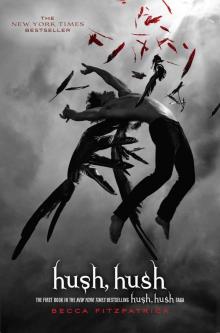 Hush, Hush
Hush, Hush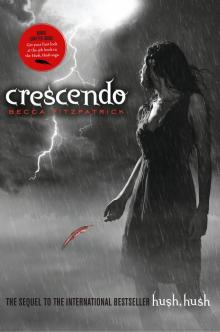 Crescendo
Crescendo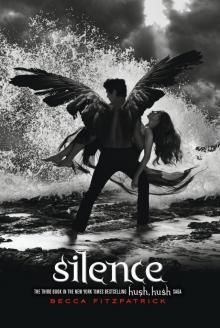 Silence
Silence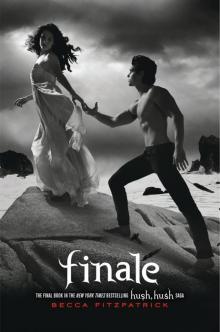 Finale
Finale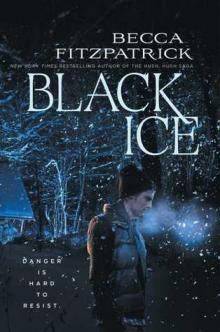 Black Ice
Black Ice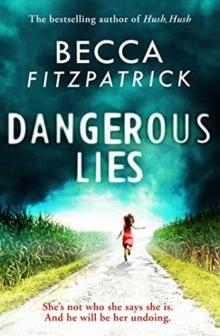 Dangerous Lies
Dangerous Lies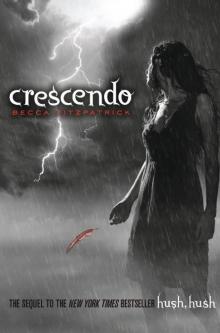 Crescendo, Hush 2
Crescendo, Hush 2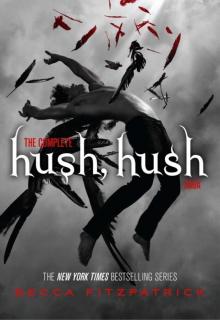 The Complete Hush, Hush Saga
The Complete Hush, Hush Saga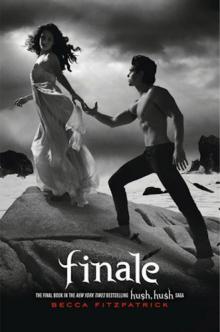 hush, hush 04 - Finale
hush, hush 04 - Finale Hush, Hush (Bonus) hh-1
Hush, Hush (Bonus) hh-1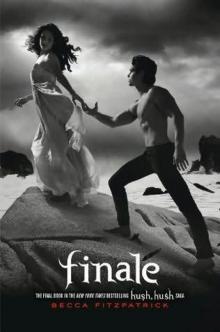 Finale hh-4
Finale hh-4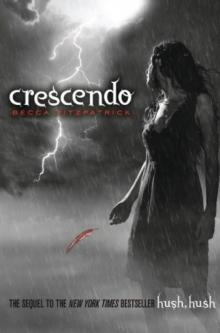 Crescendo h-2
Crescendo h-2